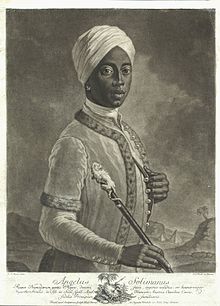Get Today in Masonic History into your Inbox. Sign up today for one of our email lists!
Need an article for your Trestleboard/Newsletter see our Use Policy
Angelo Soliman Passes Away

Today in Masonic History Angelo Soliman passes away in 1796.
Angelo Soliman was a prominent Nigerian-born Vienna citizen.
Soliman was born Mmadi Make sometime around 1721 in what is modern day Nigeria. His actual birthday is not known, later in life he adopted September 11th, the day he was baptized, as his birthday. His name Mmadi Make is tied to a prince class in the area he was born. As a child he was captured and brought to Marseilles as a slave. He was educated by the court he was sold to. Out of affection for a household servant named Angelina, he adopted the name Angelo.
After numerous requests he was given to the Imperial Governor of Sicily who was also a prince. He became the Prince's valet and traveled everywhere with the Prince, even into battle. In one battle it was reported Soliman saved the Prince's life. This paved the way for Soliman to gain his freedom. He later married Magdalena Christiani, a young widow and sister of a French general.
Despite living as a slave, Soliman was a highly cultured individual and his presence was sought after in Viennese society. Through the Masonic fraternity Soliman came to know Wolfgang Amadeus Mozart. Occasionally the two sat in lodge together. It is believed Soliman is the inspiration for the character Bassa Selim in Mozart's opera The Abduction from the Seraglio.
Despite Soliman's standing in Viennese society he was still outcast. During his life he was viewed as a model for the "assimilation" of Africans into European society. After his death on November 21st, 1796, Soliman's treatment in their society becomes shocking. Instead of being allowed a Christian burial, Soliman's body was taken. Instead of him being treated like the member of Viennese Intellectual Society he was, he was turned into a stuffed exhibit in the Imperial Natural History Collection. His remains were adorned with various items seen as traditional African and despite many requests from his children to have the remains returned, they never were. His remains burned during the October Revolution of 1848. The treatment of Soliman's remains to some degree stripped him of the standing he had in life. Regardless of the treatment his remains received, Soliman was a well recognized member of the intellectual society of Vienna.
Soliman was a member of "True Harmony" Lodge. He eventually become the Worshipful Master in the lodge and began influencing Masonic ritual adding scholarly elements into the rites. It influenced Freemasonry throughout Europe.
This article provided by Brother Eric C. Steele.

